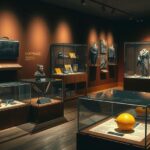The European Literary Map of London is touring Europe, showcasing literary heritage through the Lost & Found exhibition. Recent stops include Stockholm and Santiago de Compostela, with upcoming events planned. The initiative promotes discussions on cultural connections, place, and narrative, featuring various literary works in multiple languages. Future locations will expand this exploration into the relationship between European writers and London.
The European Literary Map of London (ELML) is touring Europe through the Lost & Found exhibition by the UCL European Institute. Recently, it has reached Stockholm and Santiago de Compostela, with further cities planned.
The tour showcases London’s diverse European literary heritage, supported by the UK Foreign, Commonwealth & Development Office. The exhibition engaged UCL alumni in Stockholm and highlighted cultural connections. In Seville, British Ambassador Alex Ellis launched the exhibition during the Hay Festival Forum.
In Santiago de Compostela, the exhibition featured Galician writers like Marilar Aleixandre and Eva Moreda. The Spanish segment, backed by El Corte Inglés, continues in Valencia and Madrid, offering over 100 texts in over 25 languages via the online map.
This weekend, the ELML will be featured at the Passa Porta Festival in Benelux. On 29 March, Dr Uta Staiger will lead a discussion involving authors David Nicholls and Peter Terrin about how places influence narratives.
The exhibition prompts reflection on the interplay between cities and their storytellers. Uta Staiger raises vital questions about how writers have historically shaped and been shaped by London, seeking to explore these connections further.
These events signify the start of the Lost & Found exhibition’s journey, encouraging discussions on art, culture, and identity. News of future locations will follow as the ELML continues to trace the connections between Europe’s writers and London.
The European Literary Map of London continues its European tour, bringing literary heritage to life through engaging exhibitions. Participating cities have included Stockholm and Santiago de Compostela, with ongoing events highlighting cultural connections. The initiative celebrates the relationship between writers and the city, fostering conversations on identity and literature across Europe. Future stops promise to enrich this dialogue further.
Original Source: www.ucl.ac.uk







